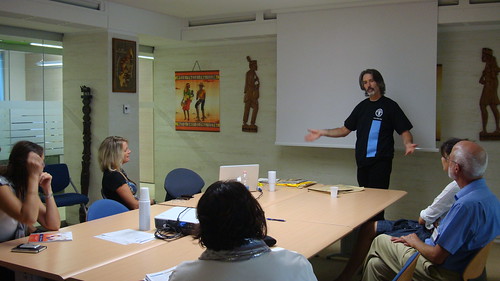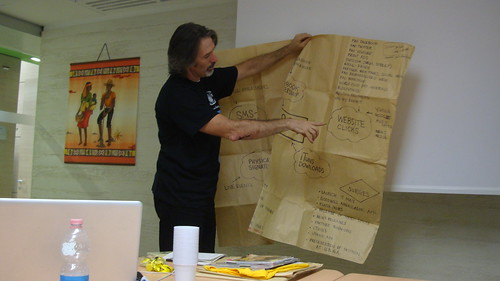The FAO Food for the Cities multi-disciplinary initiative has organized a community theatre play for sharing with the public some issues related to “Food, Agriculture and Cities”.
This initiative is an internal inter-disciplinary and inter-departmental group. In the recent years, it has developed a global network of actors, from different levels of action and involvement, including local authorities, producers, researchers, etc. The food-for-cities global network is based on a DGroups list with 900+ members from all over the world (Email: food-for-cities@dgroups.org / http://dgroups.org/fao/food-for-cities). Information on publications, studies, researches, events, meetings, or related and relevant discussions are shared and proposed by members. No moderation is in place to enhance ownership and trust of the members.
The Second AgriKnowledge Share Fair was an occasion to make the public be aware of the topic by organizing a community theatre.
Starting from a Consumer’s point of view, the Share Fair participants have been involved in a transaction, complaining on rising food prices and the need for fresh food. The attention went then to the Market seller/street vendor’s point of view, explaining the reasons of this increase. It raises the question of transportation of fresh and perishable vegetables with issues on hygiene and sanitation as well as handling and storage.
A food middleman (Transportation sector) has entered in the scene reporting the rural-urban linkages on the basis of a city-centred food system. He complains on the lack of good infrastructures, the middlemen role and the heavy corruption from producers to market.
The Producers’ voice was also reported on inputs costs increases and access to land issues. It stressed the fact that small producers have no land or that access to land is difficult and costly. Besides, access to inputs (such as seeds and fertilizers) is always more difficult. He calls for establishing an association of producers to interact with local authorities.
All these actors were then reporting to their Mayor on all these problems, while he was discussing with a Nutritionist on food and nutrition security issues in their city, saying that fat people are indeed malnourished people, just as thin ones. She argued that if hunger does not seem to be a problem anymore, still good nutrition is far from being attained since it deals with diet, hygiene, care, health etc. Improper nutrition has a very high cost on the society (both in terms of health care treatment as in terms of diminished human potential).
In the meantime a Supermarket manager was argueing that the private sector could handle the food and nutrition security problems as supermarkets ensure a stable food availability and cheap food, relying as needed on international trade. Besides, as economic development means less time at disposal of women, supermarkets answer to new challenges of city life style, with changing consumption patterns and habits. He was trying to convince the Mayor to support his business due to cheap prices of food items.
The mayor stressed the fact that he needs a comprehensive approach to the food systems with the participation of all stakeholders. He will consider food in the municipal agenda and set up a multi-stakeholders platforms including consumers, probably a local food council.
Our food systems needs to be carefully planned recognizing the important role of each actor, enhancing multi-stakeholders platforms and assemblies! Join the food-for-cities network (email: food-for-cities@dgroups.org / http://dgroups.org/fao/food-for-cities) to know more, participate and contribute!


